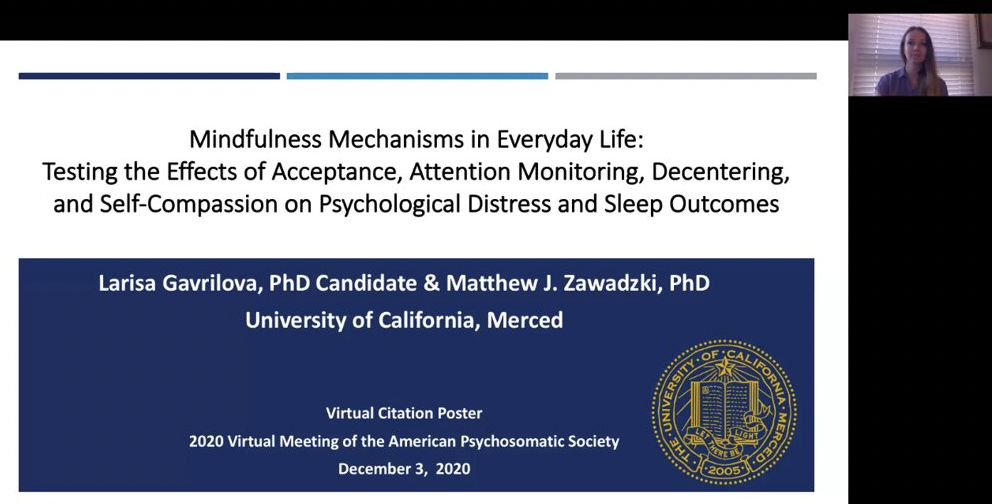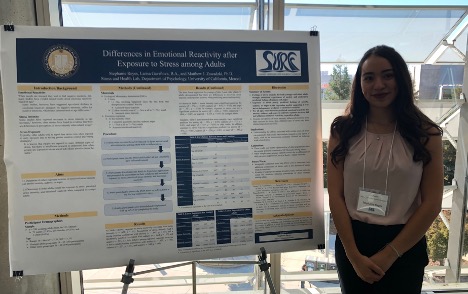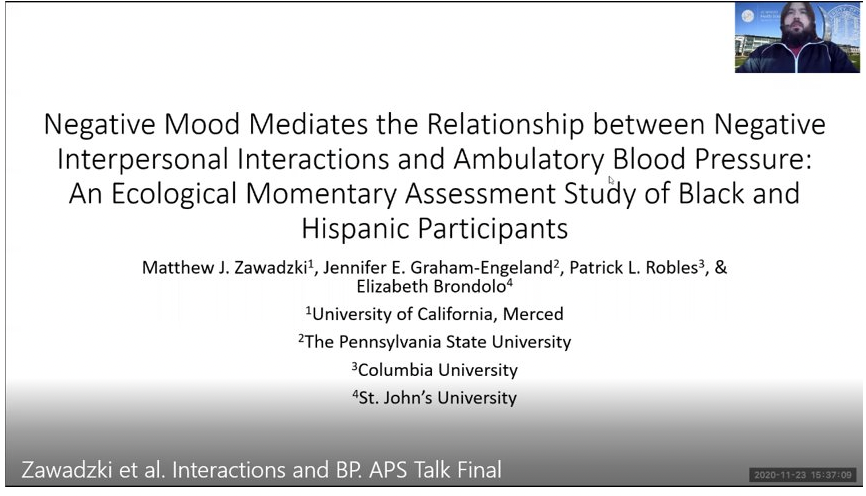Flash Talk by Matthew Zawadzki
This study tested whether negative interpersonal interactions in everyday life predict higher blood pressure (BP), and whether happiness and/or negative mood mediate the effect of interactions on BP. Multilevel models revealed that the intensity of the negative interaction was positively related to systolic BP and diastolic BP. Specificity analyses suggested these effects were driven by experiences of harassment and unfair treatment, but not by experiences of being ignored. Mediation analyses indicate negative mood is a pathway through which negative interpersonal interactions may affect cardiovascular function, and suggest the potential for just-in-time interventions to provide mood restoring resources after negative interactions.
Zawadzki, M. J. Graham-Engeland, J. E., Robles, P. L., & Brondolo, E. (2020, December 3-4). Negative mood mediates the relationship between negative interpersonal interactions and ambulatory blood pressure: An ecological momentary assessment study of Black and Hispanic participants [Poster presentation]. American Psychosomatic Society Virtual Meeting. https://psychosomatic.org/wp-content/uploads/2020/11/APS-Schedule-1.pdf
^Selected as a citation abstract and received top poster presentation award.
Flash Talk by Larisa Gavrilova
 The study examined whether acceptance, attention monitoring, decentering, and self-compassion differentially impact psychological distress, sleep duration, and sleep latency in everyday life. Multilevel mixed-effects models revealed that in the moments when participants reported high acceptance and self-compassion, they reported less psychological distress, but decentering and attention monitoring were not significant. Yet, on days when participants reported high attention monitoring, sleep duration was shorter; no other mechanism predicted sleep duration, nor did any mechanism independently predict sleep latency. Findings highlight that not all mindfulness mechanisms may similarly relate to the same health outcomes, and that mechanisms can even have negative effects.
The study examined whether acceptance, attention monitoring, decentering, and self-compassion differentially impact psychological distress, sleep duration, and sleep latency in everyday life. Multilevel mixed-effects models revealed that in the moments when participants reported high acceptance and self-compassion, they reported less psychological distress, but decentering and attention monitoring were not significant. Yet, on days when participants reported high attention monitoring, sleep duration was shorter; no other mechanism predicted sleep duration, nor did any mechanism independently predict sleep latency. Findings highlight that not all mindfulness mechanisms may similarly relate to the same health outcomes, and that mechanisms can even have negative effects.
Gavrilova, L. G., & Zawadzki, M. J. (2020, December 3-4). Mindfulness mechanisms in everyday life: Testing the effects of acceptance, attention monitoring, decentering, and self-compassion on psychological distress and sleep outcomes [Poster presentation]. American Psychosomatic Society Virtual Meeting. https://psychosomatic.org/wp-content/uploads/2020/11/APS-Schedule-1.pdf
^Selected as a citation abstract.
Differences in Emotional Reactivity after Exposure in Stress among Adults
Presented by: Stephanie Reyes

Stephanie examined whether the relationship between stress and emotional reactivity varied based on age. Stress exposure was modestly related to more anxiety, sadness, and anger, whereas stress intensity demonstrated stronger effects. Age did not moderate stress exposure or intensity on any outcome. This study demonstrated that different types of stress influence an individual's emotions, but age, at least among this working and younger sample, did not impact findings.
Reyes, S., Gavrilova, L., Zawadzki, M.J. (2020, May 21-24). Differences in emotional reactivity after exposure to stressful life events among adults [Poster Presentation]. Association for Psychological Science 32nd Annual Convention, Chicago, IL, United States. https://www.psychologicalscience.org/conventions/annual


